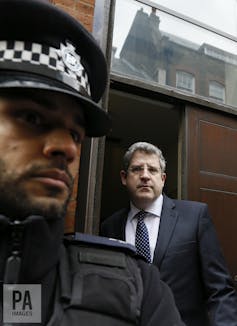Britain is gearing up for an increased risk of terrorist activity, according to the head of security agency MI5, Andrew Parker. He believes that the push against Islamic State in Syria and Iraq will force many UK-born fighters to return home and some of them will inevitably continue to pose a threat.
Part of their response to this will be to increase the use of preventative measures brought in to monitor people who are suspected of being a risk, but where there is not enough evidence to either try or deport them. TPIMs – or to give them their full name, Terrorism Prevention and Investigation Measures – generally include some sort of a sanction such as tagging or overnight home arrest.
The controversial orders made headlines in September 2013 when terrorism suspect Mohammed Ahmed Mohamed absconded from a west London mosque disguised in a burqa, despite being subject to a TPIM which required him to wear an ankle tag.
The government has recently reaffirmed its commitment to relying on TPIMs as part of its counter-terror strategy. It is seeking to renew the enablinhg legislation until 2021, since it would otherwise expire in December 2016. A government statement said that TPIMs “have been and remain a crucial component of the government’s national security response”.
TPIMs were strengthened under the Counter-Terrorism and Security Act in 2015 which reinstated forced relocation as one of the range of obligations that can be imposed on a terror suspect. Forced relocation was dropped when the old system of control orders was replaced with TPIMs by the coalition government in 2010.
Counter-terror toolkit
There seems to be a weary public acquiescence in the notion that reliance on these non-trial-based liberty-invading measures remains necessary in the face of persistent though shifting terrorist threats. They have come to occupy a niche from which they are now unlikely to be dislodged until 2021, if then.
The renewed commitment to continuance of TPIMs might seem surprising. TPIMs have been underused – as of March 2014 only ten people had been subjected to them since 2012. Two of those absconded – and most of the other TPIMs expired after reaching their two-year limit. One suspect was imprisoned for breach of his TPIM; no information was made available on the others once their TPIMs expired.
Only three TPIMs were in force by the end of August 2015 – and initially the coming into force of the Counter Terrorism and Security Act had no impact on their usage, despite their re-strengthening. Only two TPIMs were in force early in 2016 – and then only one. It appeared that they were not worth deploying in terms of their practical usefulness as part of the UK’s counter-terror response. But in late October 2016, shortly before the five-year renewal of the legislation was due, a revival of their use was reported and at present six are in force.
Reliance on TPIMs remains inherently problematic. Their use damages the UK’s reputation in constitutional terms – they rely on targeting terrorist suspects to curtail their liberty without a trial. So they create restrictions that have a punitive impact but avoid the safeguards accompanying a criminal trial – including the need for proof to the criminal standard. They therefore demand a radical departure from procedural and constitutional normality. Parliamentary scrutiny of TPIMs is very limited: in formal terms it need occur only once every five years to consider the renewal of the legislation.
On the other hand, there is a general public acceptance that TPIMs are effective in security terms as one minor but important part of the counter-terrorist toolkit. But, at face value, their efficacy must be questioned – since suspects are free to leave their residences during the day (TPIMs can impose only an overnight residence requirement) and may be able to abscond – as we have seen.
Growing threat?
Reliance on TPIMs must be juxtaposed to the current threat from terrorism; MI5’s head, Parker, recently stated in an interview with the Guardian: “There will be terrorist attacks in Britain” and there are about 3,000 “violent Islamic extremists in the UK, mostly British”.

The expected eventual military destruction of the ISIS “caliphate” in Iraq and Syria is also likely to lead to an increase in the number of high-risk returnees who have experienced weapons and explosives training – and, of about 850 persons who went abroad to support ISIS or similar groups, about half have already returned.
So it is not immediately clear what purpose TPIMs actually serve, given that if there is proof that a person has been involved in supporting terrorism they could be charged with a precursor offence, including giving support to a proscribed organisation. On the other hand, imposition of TPIMs only requires proof to the civil standard – and, also the government view is that there are some instances in which it is problematic to use security material in a criminal trial.
So if TPIMs are still found to be necessary, then enhanced parliamentary scrutiny is essential. We need to ensure that the cost in terms of Britain’s human rights record is in proportion to their actual value in terms of national security. At the moment, that’s debateable.

